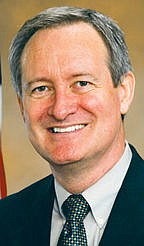A step closer to a third federal judge for Idaho
Idaho has needed a third federal judge for decades, and has been in a judicial emergency since 2003. I have fought for passage of legislation like S. 4199, the Judicial Understaffing Delays Getting Emergencies Solved (JUDGES) Act of 2024. The Senate’s unanimous passage of the JUDGES Act brings us one step closer to meeting this need.
The JUDGES Act of 2024 would address judicial emergencies and shortages across the country by increasing the number of federal district judges in the most overworked regions of the country, including adding a federal judgeship for Idaho. Idaho is one of only three states (along with North Dakota and Vermont) with only two authorized judgeships. Fellow U.S. Senator for Idaho Jim Risch and I co-sponsored this legislation and introduced similar legislation, S. 7, that would create an additional federal district judgeship in Idaho.
A remarkable 70 years have passed since Congress authorized a second federal judgeship for Idaho, and most of the pressures leading to the second judgeship have intensified. In 1954, Congress passed and the President signed into law legislation adding that second federal judgeship for Idaho and additional judgeships for other states. According to a 1953 Senate Judiciary Committee report and then-U.S. Senator Herman Welker’s (R-Idaho) testimony, Idaho’s federal judge had roughly 172 pending civil and criminal cases in early 1953, when our state had a population of 600,000. This caseload has ballooned, as Idaho’s population has grown to more than 1.8 million people. The Judicial Conference of the United States reports Idaho had a pending caseload of 1,202 at the end of June 2024 and total pending cases of 601 per judgeship.
Similarly populated states, such as Nebraska with nearly 2 million people or West Virginia with approximately 1.8 million people, have three and eight judgeships respectively. Two neighboring states with smaller populations, Wyoming (576,851) and Montana (1.08 million), have three judgeships. California has 60 plus-one temporary judgeships. New York has 52 judgeships.
While adding the additional federal district judgeships, the JUDGES Act also includes the following congressional acknowledgements:
- Article III of the Constitution of the United States gives Congress the power to establish judgeships in the district courts of the United States.
- Congress has not created a new district court judgeship since 2003 and has not enacted comprehensive judgeship legislation since 1990.
- This represents the longest period of time since district courts of the United States were established in 1789 that Congress has not authorized any new permanent district court judgeships.
- By the end of fiscal year 2022, filings in the district courts of the United States had increased by 30 percent since the last comprehensive judgeship legislation.
- As of March 31, 2023, there were 686,797 pending cases in the district courts of the United States, with an average of 491 weighted case filings per judgeship over a 12-month period.
- To deal with increased filings in the district courts of the United States, the Judicial Conference of the United States requested the creation of 66 new district court judgeships (including one judgeship for Idaho) in its 2023 report.
Further, the legislation would require the Government Accountability Office to provide recommendations to Congress on judicial caseloads and detention space.
It is far past time an additional judgeship is added in Idaho to meet the needs of an ever-growing population and legal caseload. A third district judge would address a deficiency in the legal system that has been looming since the last federal judgeship in Idaho was established. I look forward to and am continuing to push for enactment of this important legislation adding a third federal judgeship for Idaho.
Mike Crapo represents the state of Idaho in the U.S. Senate. He can be reached at crapo.senate.gov.

